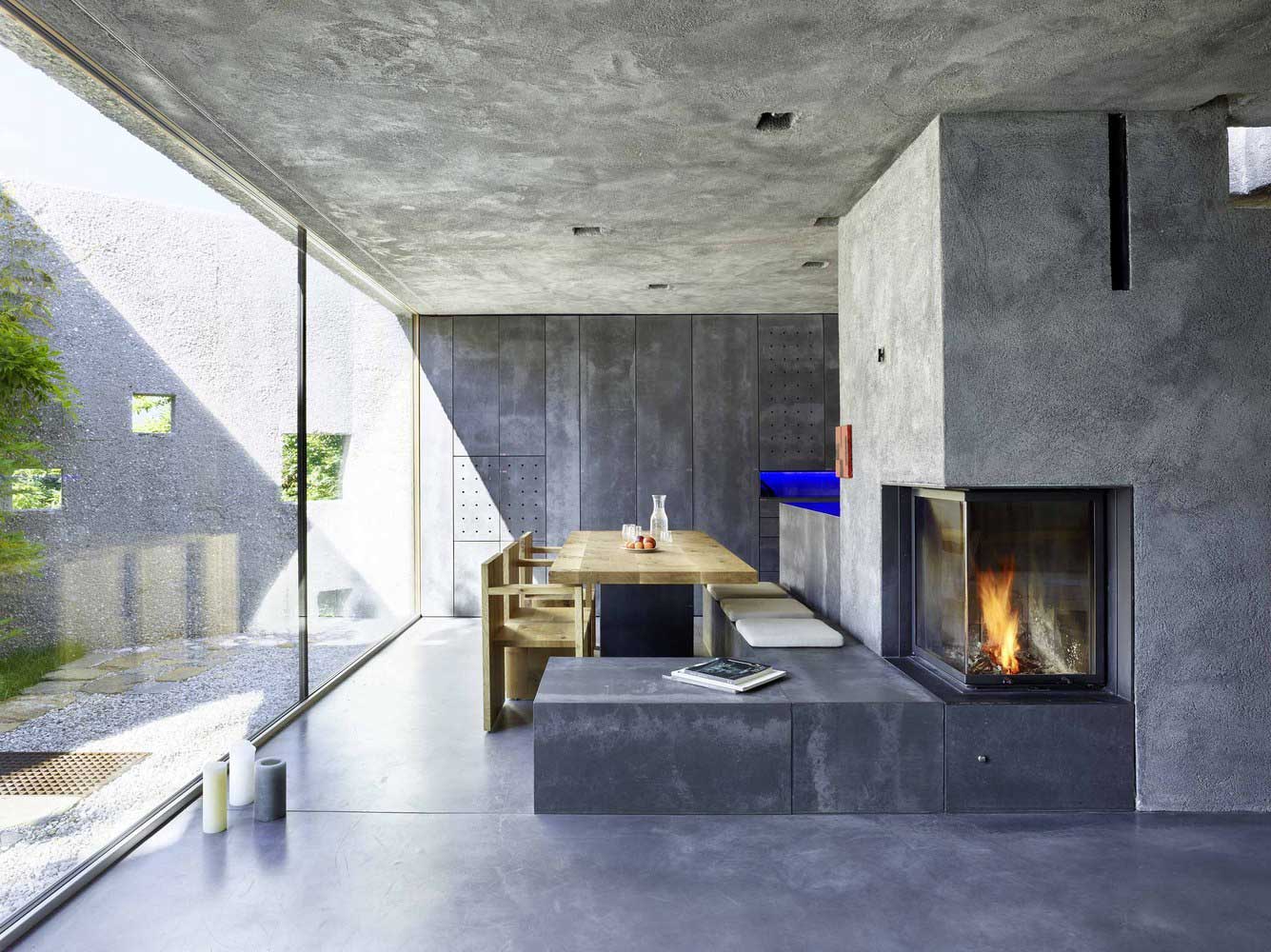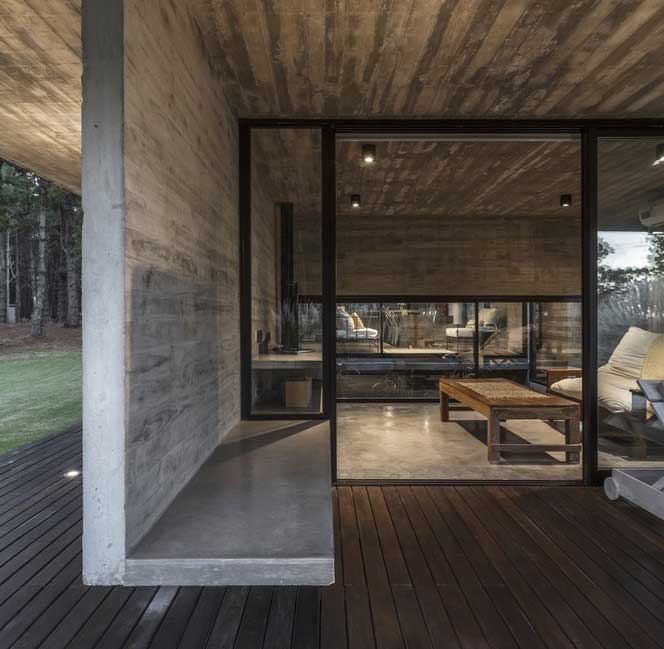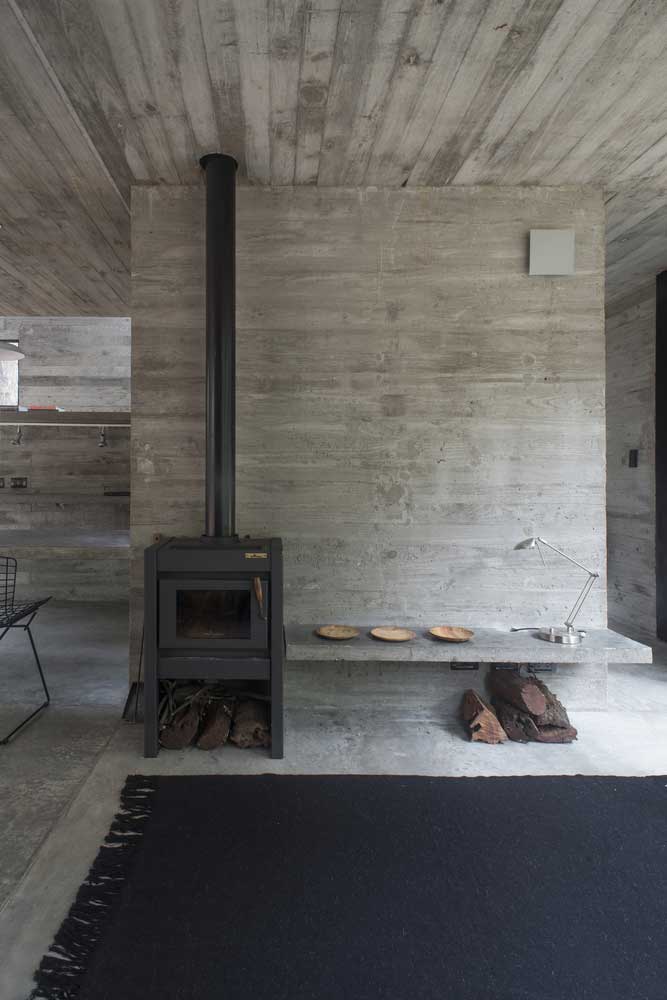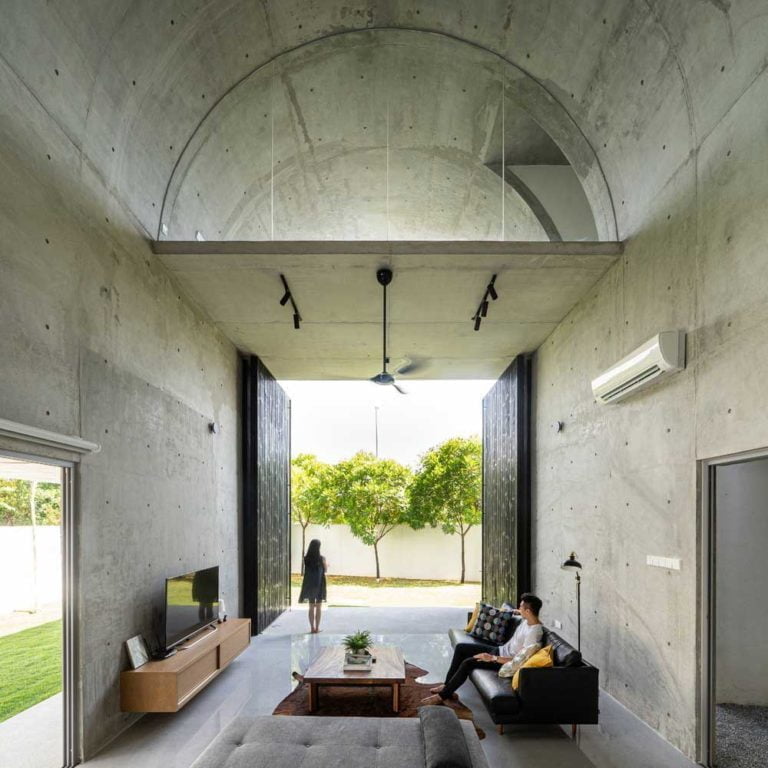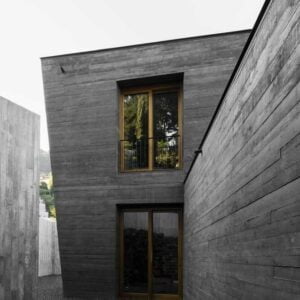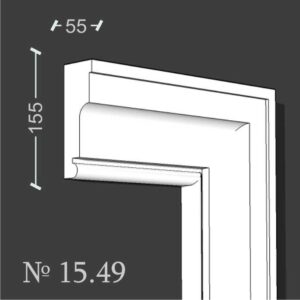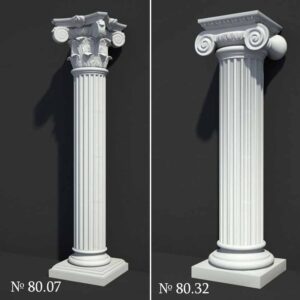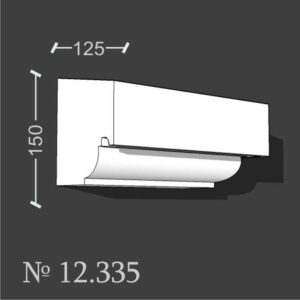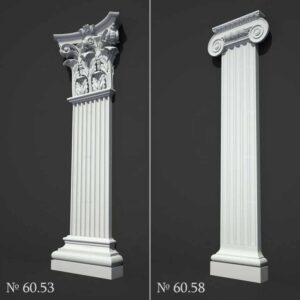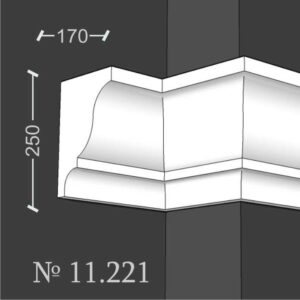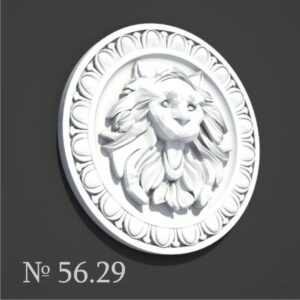Examples of the use of concrete in the interior refute the established attitude to it exclusively as a structural element of the building frame. This mixture of cement, filler and water is widely used for decorating walls, ceilings and floors, as a material for furniture, decorative parts and even fixtures.
ADVANTAGES OF CONCRETE AND ITS APPLICATION IN THE NEWEST DESIGN CONCEPTS
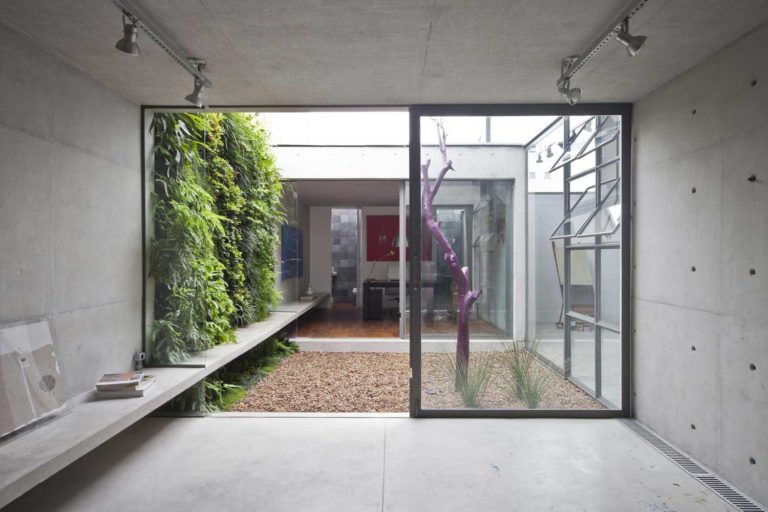
In addition to the fact that concrete gives the premises an original and modern look, it has a number of advantages:
- resistance to environmental influences;
- durability;
- extraordinary strength;
- resistance to corrosion and chemicals.
Thanks to these properties, this material has earned the respect of architects and designers.
interior concrete stain
Concrete elements in the interior look appropriate not only in the ultra-modern high-tech and industrial styles. The addition of wooden design with strong concrete partitions combined with benches illustrates the unusual free layout and innovative designs of the designer.
interior concrete finishes

The use of fillers of various shades in modern technologies allows the designer to beat any space so that the concrete does not look alien and inappropriate. In combination with wood, concrete floors, steps, benches and countertops of natural pastel colors look advantageous. The whole space is harmonized with color, despite the difference in the structure of materials in the decoration.
concrete color in the interior
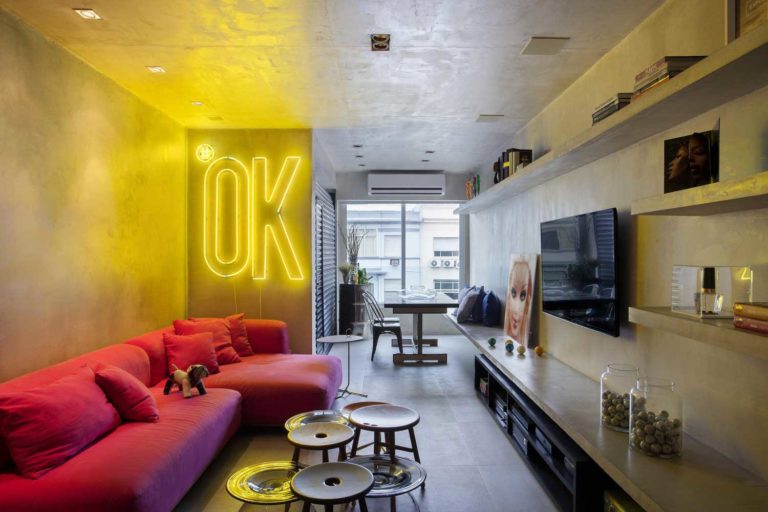
Monolithic concrete shelves do not require additional fastening and look unified with the interior. The bright upholstery of upholstered furniture, successful lighting or modern decor elements will help to dilute the concrete abundance and bring brilliance and originality to the interior.
concrete walls in the interior

Concrete surfaces can easily be given a perfect, even or rough surface. Designers have successfully used this variety to give the premises a strict classic or playful frivolity, depending on the wishes of the customer. The main thing: to comply with the measure in everything so that the apartment does not become like a factory floor. Original lamps and non-standard furniture will help to avoid this.
white concrete floors interior

The use of solid concrete countertops in the kitchen serves as a unifying factor for kitchen surfaces, as well as an addition to concrete walls and floors. The countertop will last a long time because this composite material is resistant to scratches, moisture and temperature extremes. But in this case, you should remember about the correct impregnation for concrete, so that fats and other products do not leave traces on it.
polished concrete interior

On a note! Concrete countertops have significant weight. Choosing such a structural element of the interior, take care of the reinforced substrate and sufficient strength of the racks, legs and mounts.
concrete in the bathroom interior

Concrete in the interior of all interior spaces can look fashionable and stylish. But for the design of pools, the most important difference is the moisture resistance and long service life. A polished light concrete floor softens the dark ceiling with original lighting. Walls painted in blue resonate with the azure water of the pool.
CONCRETE STRUCTURES AS INTERESTING DETAILS OF TRANSITION BETWEEN EXTERIOR AND INTERIOR

Concrete, as a universal material that has found application in the design of external and internal spaces, can serve as a successful unifying stroke. Various modifications and a wide color palette of concrete structures fit it into any design decisions.

Exterior walls and concrete walkways smoothly flow into the concrete space of the patio. The commonality of the material harmonizes the inner and outer spaces. The concrete sloping path of the open area becomes an extension of the living room floor. This unity is reinforced by the same wall decor and concrete bench, which continues in the room, as if permeating through the outer wall.

On the open terraces, a wide concrete slab, serving both as a bench and as a fence, gives the entire building ensemble a complete look. Large glazed sliding doors create a sense of unity of the interior and exterior design of concrete with the surrounding nature. In this case, the gray aesthetics of concrete helps to emphasize all the beneficial nuances of the design.
stamped concrete indoors

Do not experiment with concrete structures yourself if you do not have sufficient knowledge in construction and architecture.
stamped concrete interior

indoor concrete finishes
concrete in the living room interior
Concrete in the interior will be the highlight of the design of your home, if the choice of brand, type, additional components for it will be done by professionals.
CONCRETE WALL INTERIOR – WHAT CONCRETE WALLS CAN BE IN AN INTERIOR?
With the development of interior design and the emergence of new areas of popularity, extraordinary brick and concrete structures have gained popularity. Concrete walls in the interior are used in the setting of a loft, hi-tech, minimalism, eco, etc. Such a surface adds to the premises an urbanized shade – a fashionable trend in modern architecture.

In the project of the house by Fabian Tan Architect, concrete surfaces became the basis of the interior – here they are used not only as accent, but also as the main structures. The stylization of concrete walls in the interior below the surface without a fine finish adds a special charm and effect to the housing.

smooth interior cement wall
The smooth surface is more comfortable and safe, it is easy to clean and dust does not settle on it – therefore, this type of concrete wall was used as the basis. Such designs are distinguished by a fairly industrial appearance.

Concrete rooms look simple, but quite bold and unusual in the context of living space. The living space is closely connected with the environment due to the large area of glazing, doors that open directly to the garden. Therefore, even with concrete walls in the house, the effect of a closed box is not created – the natural landscape seemed to be a continuation of the living space.

textured indoor concrete wall
Textured surfaces are a fashion trend. In the presented project, they are not used everywhere, but for contrast and emphasis. Due to the fact that the textured concrete almost authenticly repeats the surface without any finishing work, it gives the space a special, industrial atmosphere.
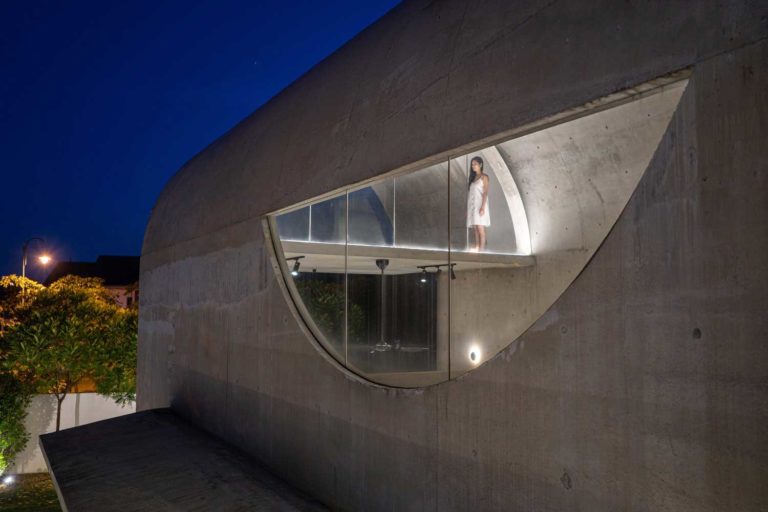
Seams between plates and fastening metal elements also remain without additional processing. Due to the furnishing of the interior with solid modern furniture, high-quality natural insolation and artificial lighting, a cozy atmosphere is still preserved here.

curved internal concrete walls – a unique technique in the interior
The peculiarity of monolithic concrete walls is that they can be performed in almost any form – while they can be either supporting structures or simply partitions.

The peculiarity of the walls in the bedrooms, the office of the house represented is that they are curved both horizontally and vertically. The wall flows smoothly into the ceiling, forming an arch-shaped structure. The windows are also in the shape of an arch.

An arched concrete structure made in one of the bedrooms was a continuation of the terrace on the second floor. The monolith made it possible to realize smooth transitions between different residential areas – the social space is dynamically transformed into private rooms. Curved concrete walls became a tool for implementing such an idea.

Using concrete walls in the interior, designers and architects of Fabian Tan Architect bureau managed to achieve the ultramodernity of the building, maintain a trendy loft style in it, adding hi-tech and minimalism elements. Housing with concrete walls is suitable for those who are chasing trends, not afraid of extraordinaryness and appreciate the special atmosphere of urbanized space.

